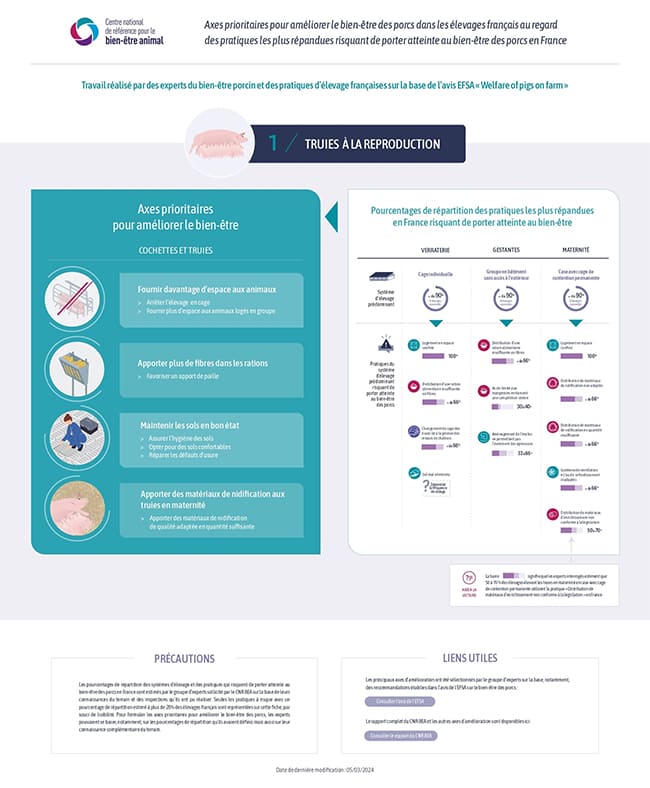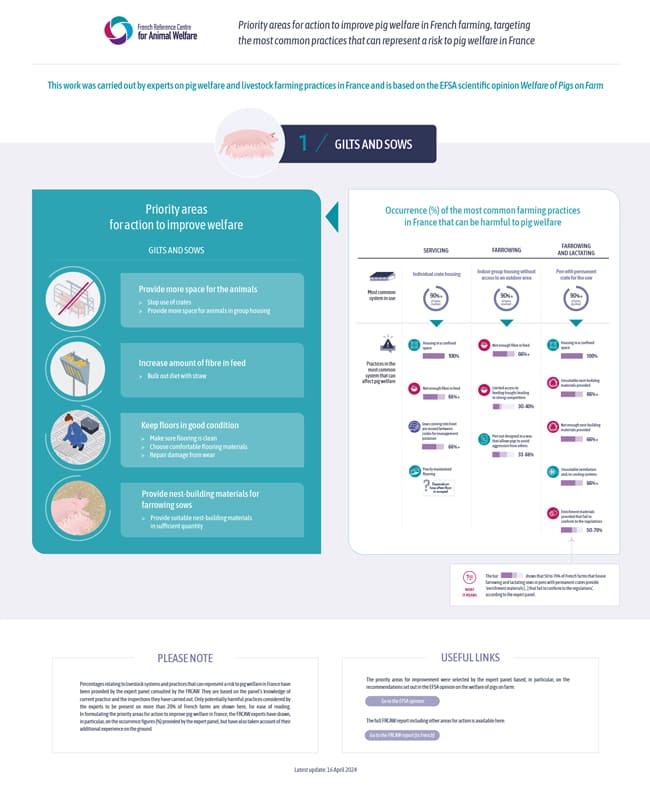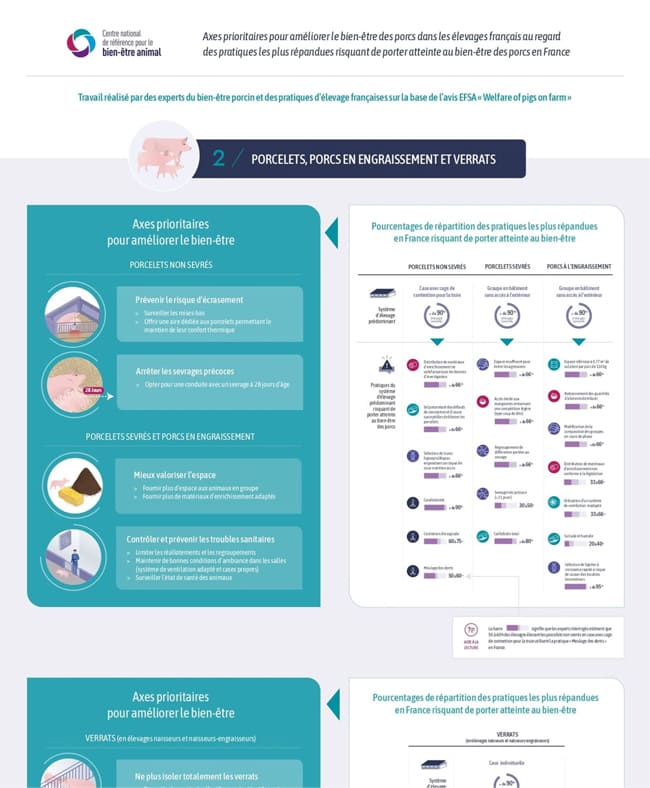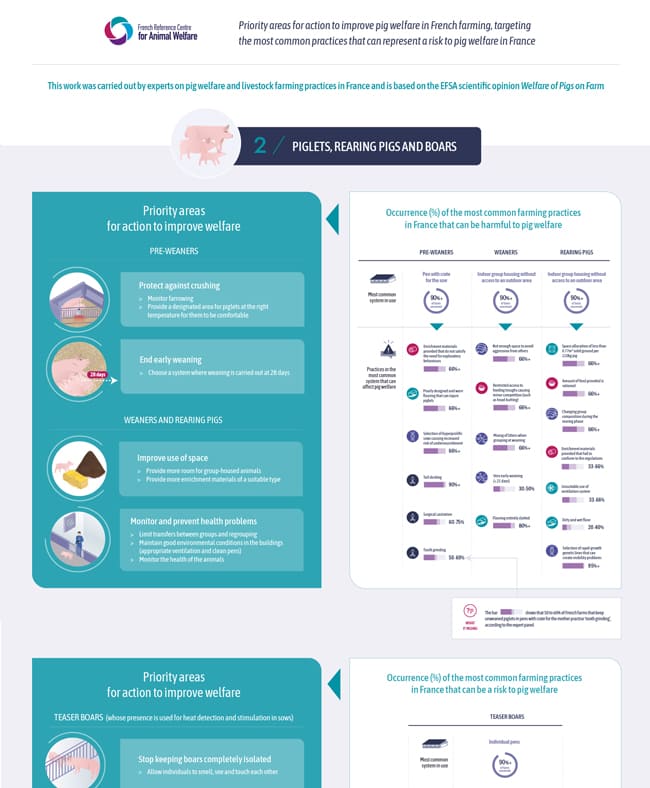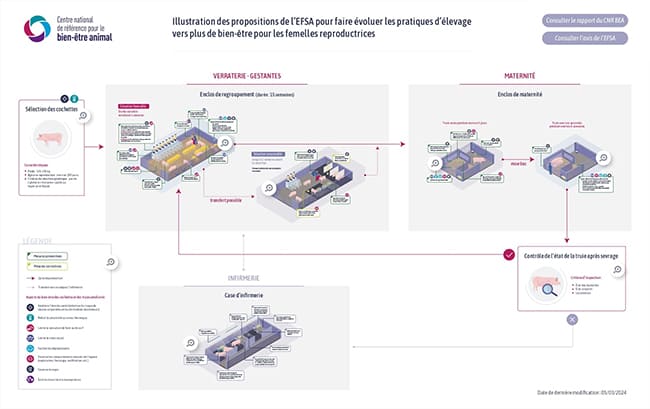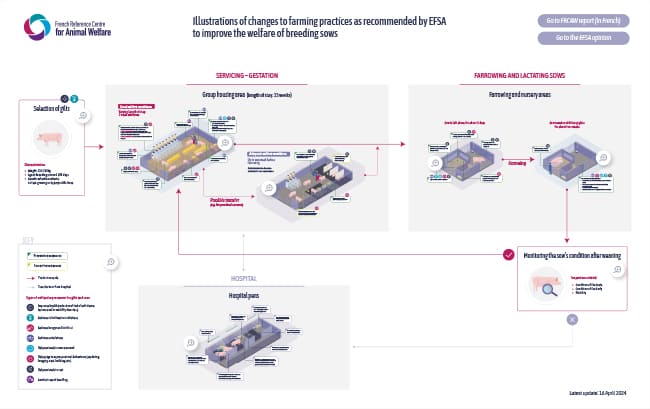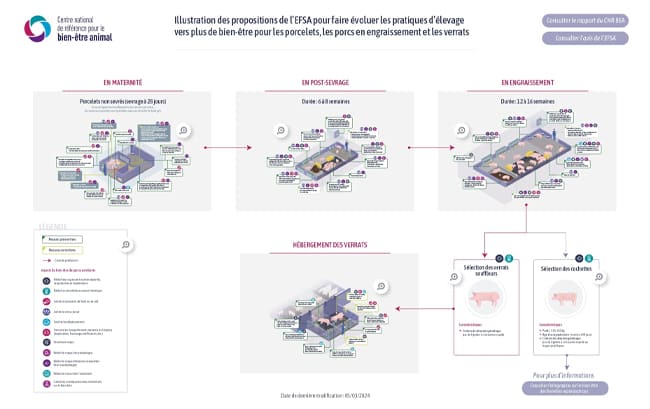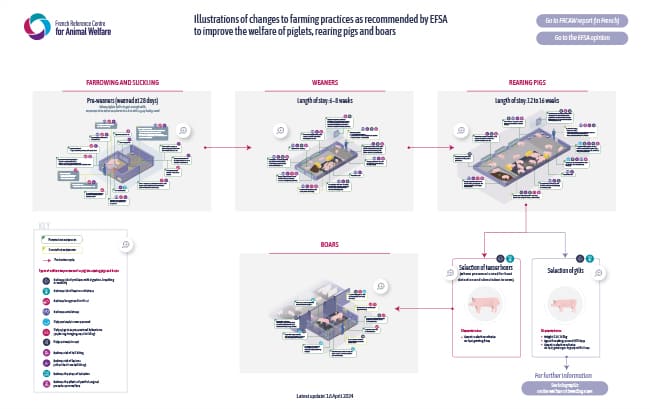Full title: Opinion of the FRCAW on the implications for French farming of the EFSA opinion on pig welfare
Requested by: Animal Welfare Office (BBEA)/DGAL - French Ministry of Agriculture and Food
Date of request: 03/15/2023
Delivery date: 25/04/2024
DOI: 10.17180/5yp3-yt48
Context
As part of the European Union’s Farm to Fork strategy to support more sustainable farming practices, the European Commission is undertaking a complete revision of its regulations on animal welfare. To fulfil this task, the Commission ordered the European Food Safety Authority (EFSA, the European reference authority for the assessment of risk in the food sector) to report to it on the most recent advances in scientific knowledge with regard to animal welfare. The opinions delivered by EFSA constitute the scientific basis on which the Commission will rely in its revisions to the regulations. EFSA’s opinions cover several areas: 1. Welfare of animals at slaughter ; 2. Welfare of animals during transport, and 3. Welfare of animals on farm. In preparation for the European negotiations over the revision of the legislation, the Directorate General for Food’s Animal Welfare Office formally requested the FRCAW to study, as a matter of priority, the opinions delivered by EFSA concerning on-farm animal welfare in order to highlight those farming practices most likely to impact animal welfare in France. The present report concerns itself with the particular case of pig welfare on French farms, looking individually at several categories of animal : gilts and sows in the servicing area, gestating gilts and sows, gilts and sows during farrowing and suckling, pre-weaners, weaners, rearing pigs and boars.
Main conclusions of the FRCAW
In France gilts and sows in the servicing area are mostly kept in individual cages. According to EFSA, these farming conditions compromise the welfare of individuals by restricting movement, causing resting problems, restricting the expression of foraging behaviours, causing prolonged hunger, and exposing them to social stress. Ending the use of restrictive housing, better management of diet to promote satiety in sows, and keeping floors in a good state are the priority areas for action to improve the welfare of gilts and sows in servicing areas on French farms.
In France gestating gilts and sows are mostly kept in indoor group housing without access to the outside. According to EFSA, these farming conditions compromise the welfare of individuals by restricting the expression of foraging behaviours, causing prolonged hunger, soft tissue lesions and locomotory disorders, and exposing them to social stress. The allocation of pens with sufficient floor space to allow individuals to create separate functional areas, the erection of protective barriers within pens and better management of diet to promote satiety in individuals are the priority areas for action to improve the welfare of gilts and sows in gestation areas on French farms.
In France farrowing and lactating gilts and sows are mostly kept in individual cages or crates. According to EFSA, these farming conditions compromise the welfare of individuals by restricting movement, causing resting problems, restricting the expression of their maternal and foraging behaviours, causing soft tissue lesions and exposing them to social and heat stress. Transition to free farrowing systems and the provision of sufficient and appropriate nest-building materials are the priority areas for action to improve the welfare of farrowing and lactating gilts and sows.
In France pre-weaners are mostly kept in maternity pens (with a crate for the sow). According to EFSA, these farming conditions compromise the welfare of individuals by restricting the expression of their foraging behaviours, causing soft tissue lesions, causing prolonged hunger and thirst, and exposing them to social stress. Assuming that pre-weaners will in future be raised in loose farrowing and lactating systems, the priority areas for action to improve their welfare on French farms will involve the implementation of measures to mitigate the risk of crushing and weaning at 28 days old.
In France weaners are mostly kept in indoor group housing without access to the outside. According to EFSA, these farming conditions compromise the welfare of individuals by restricting the expression of foraging behaviours, causing soft tissue lesions and digestive disorders, and exposing them to social stress. The use of regulated heating and ventilation systems, the adoption of good mixing practice for the animals, and better use of space (enlargement of pens and provision of appropriate enrichment materials in terms of quality and quantity) are the priority areas for action to improve the welfare of weaners on French farms.
In France rearing pigs are mostly kept in indoor group housing without access to the outside. According to EFSA, these farming conditions compromise the welfare of individuals by restricting their movement, causing resting problems, restricting the expression of foraging behaviours, causing soft tissue lesions and locomotory and respiratory disorders, and exposing them to social stress. Better prevention of health problems by avoiding the mixing of unfamiliar individuals, keeping floors clean and monitoring for signs of illness, and better use of the space are the priority areas for action to improve the welfare of rearing pigs on French farms.
In France boars kept on farms are mostly housed in individual indoor stalls with no access to outdoors. According to EFSA, these farming conditions compromise the welfare of individuals by restricting their movement, restricting the expression of foraging behaviours, causing soft tissue lesions and locomotory disorders, inducing prolonged hunger, and exposing them to stress associated with isolation. Farming boars in a way that does not completely isolate them from their fellows, respecting the vaccination schedule and improved use of space are the priority areas for action to improve the welfare of boars on French farms.
Infographics on priority areas for action in France
Infographics illustrating changes recommended by EFSA

